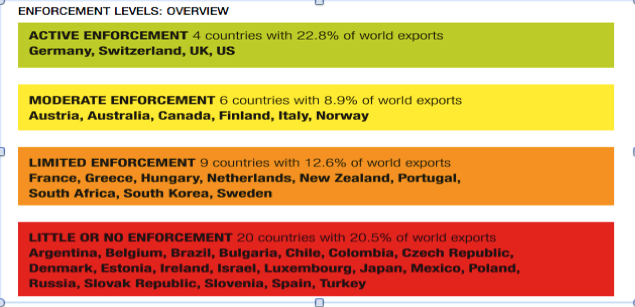Ethics Analysis: Foreign Bribery
By: Rachel Thomas
Part 2 in SPI’s Trump Financial Ethics Watch Series
Trump’s Repeal of Disclosure of Payments Rule for Oil and Mining Companies
On February 14, President Trump signed his first piece of legislation, H.J. Resolution 41, repealing an anti-corruption measure that required oil and mining companies to disclose their payments to foreign governments. The resolution repeals a Securities and Exchange Commission (SEC) rule written under the 2010 Dodd-Frank financial reform law. The purpose of the SEC rule was to safeguard against corruption in resource-rich countries by mandating companies on US stock exchanges disclose the royalties and other payments that oil, natural gas, coal and mineral companies make to governments. The administration and supporters of the repeal argue the disclosure adds compliance costs to American energy companies and is a competitive disadvantage. However 38 of the world’s 100 largest oil and gas companies are subject to public disclosure mandates including Russian firms Rosneft and Gazprom. The stock markets in the European Union, Canada and Norway already require similar data from extraction companies. The biggest losers from this legislation are the citizens of those countries to which payments are made because their governments will be able to hide their true revenues. Having more information about how much money their governments receive from oil and gas companies would enable citizens to question how incoming revenues are spent and fight corruption and fraud.
Background on Foreign Bribery
The Organization for Economic Co-operation and Development (OECD) adopted an anti-bribery convention in 1997 to curtail foreign bribery, signaling its belief that dealing with corrupt governments carries a risk of supporting regimes that commit human rights violations. Despite the conclusion of the convention, more than half of OECD countries have failed to prosecute any foreign bribery cases since 1997. According to Transparency International, only four out of 33 OECD countries actively enforce foreign anti-bribery laws (the four include: the United Kingdom, the United States, Germany, and Switzerland). Twenty of those committed to the convention have little or no enforcement.[1]
Source: Transparency International
Bribery is an unethical practice, as it increases wealth inequality and supports corrupt regimes. As an immoral act, bribery should be prosecuted even in countries in which it is an acceptable practice. Businesses and governments should be considered moral entities that enter into a social contract. Governments that fail to prosecute foreign bribery cases are complicit in the bribe and responsible for the consequences that ensue.
The failure to prosecute foreign bribery cases raises many ethical questions. If a society condemns bribery inside their borders, why would that society turn a blind eye to bribery cases in other countries? Does a government have a responsibility to prevent their citizens from paying or accepting bribes when operating in different cultures? Is foreign bribery an absolutely immoral act, even if it is an acceptable practice in the society in question?
In the foreign bribery debate, those in favor support their argument using cultural relativism, and those against counter with the support of arguments based on ethical imperialism. Yet another view is that under Rawls’s Social Contract theory, bribery is an unethical practice that places an undue burden on the worst off in society. Governments should play a role in preventing bribery.
Ethics Analysis: Foreign Bribery
Globalization drives countries to share ideas, capital, and technology. Theoretically, this process allows nations to invest in each other’s development, forming mutually beneficial relationships. Investing in foreign markets leads to economic development and higher standards of living for poor countries, while allowing wealthier nations to increase their wealth and spread their perspectives (Globalization 101). Opponents of globalization believe it allows wealthy nations to exploit the worst off in poor societies while bolstering corrupt regimes.
Many opponents point to the practice of bribery as evidence globalization is exploitative. Countries led by corrupt regimes tend to exchange access to their markets for money or services from wealthy investors (Donaldson). Due to the unstable political and economic environment of these countries, rulers can elicit bribes to line their own pockets while their citizens live in poverty (Transparency International). Citizens living under corrupt regimes often have little political efficacy, and wealth inequality is a pressing concern.
Paying a bribe could support a regime that commits human rights violations, and it is unlikely that the funds will trickle down to improve the well-being of citizens. However, even a marginal increase in public revenue could vastly improve the quality of life in some impoverished nations (Galang). Some economists claim that bribes can be considered a type of tax, or another economic cost of a company conducting business in a foreign market (Gutierrez).
Two major arguments exist in the foreign bribery debate. Using the framework of cultural relativism, defenders argue, if bribery is an acceptable practice in the foreign nation, it is acceptable for a business to participate (Donaldson). Cultural relativism asserts, “no culture’s ethics are better than any other’s” so “there are no international rights and wrongs” (Donaldson). This position views accepting or paying bribes to conduct business in a country where this practice is common as neither a moral nor an immoral act.
Opponents refute this argument by applying the concept of ethical imperialism, which claims there are certain absolute moral truths that apply to every culture in every situation. If bribery is considered immoral because it violates a moral truth, it is unacceptable in any culture. This approach values a list of moral truths over cultural norms and condemns any action that violates a truth, regardless of the situation.
Cultural relativism and ethical imperialism represent two extreme views on bribery practices. It is most practical to keep cultural and situational contexts in mind when approaching the issue (Donaldson). The goal is to find a balance between absolute moral truths and allowing individuals freedom to act in accordance with cultural norms.
Bribery and a Duty to Fairness
Rawlsian Social Contract theory claims individuals in a society will accept the practices they believe are fair, and each individual equally shares in the benefits and burdens of society. If an individual feels a practice exploits her, or could potentially exploit another individual, that practice should be deemed unfair in the society (Seven Pillars Institute). Benefits and burdens should be distributed among individuals to ensure that even the worst off in the society are not overly burdened.
Bribery can be viewed as exploitative. There are some cases in which bribery is a mutually beneficial transaction whereby both parties emerge better off. For example, if a corporation pays a foreign official a bribe in exchange for permission to conduct business in the country, both parties win. However, the exchange is exploitative because it violates the corporation’s duty to fairness. Although both parties benefit, the transaction will have the negative externality of sustaining corruption and inequality in the culture. The corporation is exploiting the corrupt political system that allows bribery to occur. Such political systems typically feature a powerful elite amassing wealth at the expense of a poor citizenry. Therefore, the bribe indirectly supports exploitative actions of a corrupt regime, making it an exploitative practice.
Although the bribe occurs in a different society with a different social contract, the corporation breaches its own duty to fairness. By making a deal in a corrupt country, it places unequal burdens on the citizenry by supporting a crooked regime. If the corporation were in the position of the worst off (the citizens of the corrupt government), it would feel exploited (Seven Pillars Institute). The fact the deal occurred in a foreign country does not negate the immorality of the practice, as the corporation knowingly committed an act it views as unfair in its own society.
Government and its Responsibility to a Duty to Fairness
Governments are created to enforce social contracts and should be held to the same standards as individuals. If a society has deemed supporting exploitative regimes to be unfair, then the government has a responsibility to uphold this principle. Anti-foreign-bribery laws should be enacted and enforced. A government can prevent bribery through strict prosecution of violators. The United States has so far, been an active prosecutor of foreign bribery cases and uses the Foreign Corrupt Practices Act to enforce its condemnation of bribery (Clayton).
OECD nations can also be viewed as individuals engaging to form a multinational society and agreeing to a social contract. The 1997 anti-bribery convention gathered 33 countries to agree bribery was an immoral and unacceptable practice (Transparency International). The failure of 29 of these countries to actively prosecute violators of this belief is a breach of the social contract.[2] It concentrates burdens on some individuals, including the countries that actively enforce their laws and citizens exploited by their corrupt rulers. Countries that fail to prosecute cases benefit from increased economic development at a cheaper cost, while countries that enforce their laws lose these opportunities.
The Cost of Bribery
The practice of foreign bribery strengthens corrupt regimes and continues wealth inequality in impoverished countries. For example, Uzbekistan uses state-sponsored forced labor to harvest cotton. The $1 billion in profits from this practice “goes to a small elite of the most powerful in the country, while most of the population remains impoverished” (Transparency International). Forced labor can be considered an exploitative practice that hurts the impoverished citizenry and a human rights violation, as the people are enslaved against their will. President Kamirov’s daughter has reportedly received over “one billion [dollars] worth of payments and ownership shares out of international telecom-related companies” (Transparency International). China, Japan, and South Korea are the largest investors in the country. However, despite the human rights violations committed by the regime, these countries have not investigated or sanctioned any companies dealing with Uzbekistan.
The Repeal of Transparency
In regards to Trump’s repeal of the disclosure mandate on extractive industries, the Economist writes “it is an unfortunate moment for the United States to stall progress towards greater openness, because the transparency initiatives were beginning to demonstrate results.” There is growing evidence information disclosures on payments supports greater competition in government contracting and being a signatory of the Extractive Industry Transparency Initiative (EITI) results in increased foreign direct investment. Research by the International Monetary Fund suggests greater transparency around economic and government data leads to a reduction in the spreads of emerging market sovereign bonds. Ensuring strong economies abroad is not only good for those countries but also for the US as it increases the buying power for American exports.
Editor: Eric Witmer
-x-
Works Cited
“Applying Rawls Theory of Justice to Finance.” Seven Pillars Institute. The Seven Pillars Institute, n.d. Web. 26 June 2016.
Clayton, Stephan. “Top Ten Basics of Foreign Corrupt Practices Act Compliance for the Small Legal Department.” ACC. Association of Corporate Counsel, 01 June 2011. Web. 26 June 2016.
Donaldson, Thomas. “Values in Tension: Ethics Away from Home.” Harvard Business Review. Harvard, 01 Sept. 1996. Web. 26 June 2016.
Enforcement Levels: Overview. Digital image. Transparency.org. Transparency International, 20 Aug. 2015. Web. http://www.transparency.org/exporting_corruption/
Galang, Roberto Martin N. “Doing Business in Corrupt Places.” Journal of Management Studies (2011): n. pag. Strategy Business. Web. 26 June 2016.
Gutierrez, Eric. “Why Business Should Care about Fighting Corruption | Eric Gutierrez.” The Guardian. Guardian News and Media, 01 July 2011. Web. 26 June 2016.
“How Some OECD Governments Do Nothing to Stop Their Companies Financing Grand Corruption Abroad.” Transparency.org. Transparency International, 16 Mar. 2016. Web. 26 June 2016.
“What Is Globalization?” Globalization101. The Levin Institute, 2016. Web. 26 June 2016.
Notes
[1] Transparency International, http://www.transparency.org/exporting_corruption/
[2] The 29 countries are: France, the Netherlands, South Korea, Sweden, Hungary, South Africa, Portugal, Greece, New Zealand, Japan, Russia, Spain, Belgium, Mexico, Brazil, Ireland, Poland, Turkey, Denmark, the Czech Republic, Luxembourg, Argentina, Chile, Israel, Slovakia, Colombia, Slovenia, Bulgaria, and Estonia.
Image courtesy of www.teapartytribune.com


